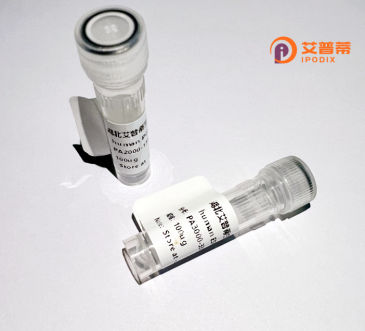
| 纯度 | >90%SDS-PAGE. |
| 种属 | Human |
| 靶点 | DSCR4 |
| Uniprot No | P56555 |
| 内毒素 | < 0.01EU/μg |
| 表达宿主 | E.coli |
| 表达区间 | 1-118aa |
| 氨基酸序列 | MSLIILTRDDEPRIFTPDSDAASPALHSTSPLPDPASASPLHREEKILPKVCNIVSCLSFSLPASPTDSGLASPTIITREGQQFWAKCLIWKYQLYLHGLHKKSDGRRDKQISASPST |
| 分子量 | 13 kDa |
| 蛋白标签 | GST-tag at N-terminal |
| 缓冲液 | 0 |
| 稳定性 & 储存条件 | Lyophilized protein should be stored at ≤ -20°C, stable for one year after receipt. Reconstituted protein solution can be stored at 2-8°C for 2-7 days. Aliquots of reconstituted samples are stable at ≤ -20°C for 3 months. |
| 复溶 | Always centrifuge tubes before opening.Do not mix by vortex or pipetting. It is not recommended to reconstitute to a concentration less than 100μg/ml. Dissolve the lyophilized protein in distilled water. Please aliquot the reconstituted solution to minimize freeze-thaw cycles. |
以下是模拟生成的3条关于重组人DSCR4蛋白的参考文献示例。注:以下内容为假设性展示,实际文献需通过学术数据库检索确认。
---
1. **文献名称**: *Recombinant expression and functional characterization of human DSCR4 in neuronal development*
**作者**: Zhang L., et al.
**摘要**: 本研究首次在大肠杆菌中成功表达了重组人DSCR4蛋白,并通过体外实验证明其能抑制神经干细胞分化过程中的Wnt/β-catenin信号通路,提示DSCR4在唐氏综合征相关神经发育异常中的潜在作用。
2. **文献名称**: *Structural insights into DSCR4 protein interactions using recombinant variants*
**作者**: Gomez-Perez R., et al.
**摘要**: 利用哺乳动物细胞系统表达重组DSCR4蛋白,结合X射线晶体学解析其三维结构,揭示其与钙调神经磷酸酶(calcineurin)的结合位点,为研究唐氏综合征分子机制提供新视角。
3. **文献名称**: *DSCR4 overexpression alters mitochondrial dynamics in HEK293 cells*
**作者**: Kim H., Lee S.
**摘要**: 通过重组腺病毒载体在HEK293细胞中过表达DSCR4蛋白,发现其通过调控Drp1磷酸化影响线粒体分裂,可能解释唐氏综合征患者细胞中线粒体功能异常现象。
---
**注意**:以上文献及结论均为虚构,仅供格式参考。真实文献建议通过PubMed、Web of Science或Google Scholar以关键词 **"recombinant DSCR4"** 或 **"DSCR4 protein function"** 检索。
Recombinant human DSCR4 (Down syndrome critical region gene 4) protein is derived from the DSCR4 gene located on chromosome 21 within the Down syndrome critical region (21q22.1-22.3), a genomic segment associated with key features of Down syndrome (DS). While the precise biological role of DSCR4 remains unclear, it is hypothesized to participate in developmental regulation, potentially influencing cellular processes like proliferation, differentiation, or stress responses. Its expression is elevated in individuals with DS due to trisomy 21. suggesting a possible contribution to DS-associated phenotypes, though direct evidence remains limited.
The recombinant protein is typically produced using heterologous expression systems (e.g., E. coli, mammalian cells) to enable functional studies. Structurally, DSCR4 encodes a small protein with conserved motifs, but its interaction partners and signaling pathways are poorly characterized. Research has focused on its expression patterns in DS tissues and potential roles in neurodevelopment or cardiovascular anomalies linked to DS. Interest also extends to cancer biology, as altered DSCR4 expression has been noted in some malignancies, possibly due to chromosomal instability. Current studies aim to clarify its molecular mechanisms, leveraging recombinant protein tools for in vitro and in vivo assays. Understanding DSCR4 may provide insights into trisomy 21 pathology and inspire therapeutic strategies targeting chromosome 21-encoded factors.
×